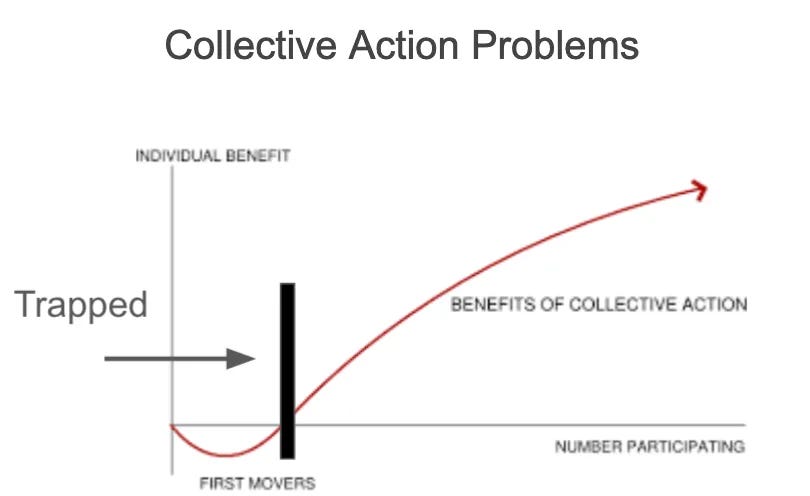RE: Solving the Social Dilemma: Many Paths to Social Media Reform
Another flimsy 'market failure' being used to justify state action.
This is a response to Solving the Social Dilemma: Many Paths to Social Media Reform by Zach Rausch. It’s a good article that’s part of the valuable project of investigating the harms of social media in children and solutions to those harms.
The problem I have with the article is about the justification used for actions. The article is centered around “Collective Action Problems”. CAPs are a kind of market failure where society gets trapped in a suboptimal situation because doing the right thing is more expensive for the first people doing it than for the last.
Zach uses an example about fire safety in textile factories as a demonstration of CAP but the problem is that fire safety isn’t a CAP. In CAPs first movers get wrecked but late adopters flourish. In the case of fire safety, the first person would have a disadvantage but the very last person would face the same disadvantage. In fact, that last person to adopt fire-safety standards would have a competitive edge against the entire market as long as they hold out, so they'd have an even stronger reason than the first to avoid action. Individual benefit for the last 1% of adopters would be lower than the first 1%, with all of them below the cost-benefit line.
Legislation didn't allow us to "push past" the dip. From a producers perspective, fire-safety is just another cost (as is having your factory burn down). We can assume that it costs more to make your factory safe than it does to risk it being burned down because otherwise producers would already be implementing it. Being forced to pay that cost doesn't remove it as a cost or solve a collective-action problem. It makes textiles more expensive and reduces the number of people who die in horrific accidents. This may be a worthwhile goal but it’s not a market failure (at the very least, not a CAP).
This is important because state action is usually justified through some kind of market failure. If the market is working normally then people are just expressing their preferences and making choices according to their best interests. Overriding those choices with state action is a drastic move that does a lot of harm to individual liberty so we tend to only do so when the market in question has peculiar properties that warp the ordinary logic of people trying to improve their circumstances.
The case of social media as a collective action problem is stronger than the example Zach used. Social media is like smoking. It's bad for your health but if all your friends do it then it's hard to be the first one to quit. The first person to quit gets the health benefits, but wears enormous social costs of being the odd one out (so they are below the line). The last person to quit gets all the health benefits and pays none of the social costs so their benefit is the highest (so they are above the line).
The thing is, this being a CAP still doesn’t justify state involvement. We age-gate smoking because kids shouldn't be allowed to go take addictive drugs (even if they're the only one doing it). If social media is really toxic the way smoking is, then we aren’t going to age-gate it to solve the CAP, we’re going to age-gate it because it a health and consent issue. If parents and schools wanted to act, they would. Parents and schools have had no issue banning smoking - they only had problems with limiting access. Laws that prevented retailers from selling cigarettes to children aided the pre-existing social prohibition. In the case of social media, the problem isn't that parents and schools can't act, it's that they don't feel the need to. Social media happens exclusively through devices that children cannot afford and which feature an enormous amount of safety controls that are able to place limits on what devices can be used for. The excuse that “my child will be the odd one out, so I have to let them do it” is as weak in the case of social media as it is in the case of smoking.
Instead, activists and researchers need to do the the hard work of convincing the public that they need to take action instead of trying to pull an end-around by convincing legislators to act for them. Being a Cassandra (someone who speaks true prophecies, but is never believed) is not a market failure. The fact that people aren’t as energetically addressing the problem as you’d like them to is not an excuse to force action through the state.





